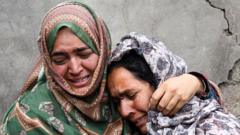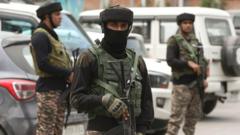In a significant development in the long-standing conflict between Indian security forces and Maoist insurgents, a key leader of the Communist Party of India (Maoist) was killed during a gun battle in Chhattisgarh state.
Maoist Insurgency Faces Major Blow as Leader is Killed in Chhattisgarh

Maoist Insurgency Faces Major Blow as Leader is Killed in Chhattisgarh
Top Maoist leader Nambala Keshava Rao, also known as Basavaraju, gunned down by Indian security forces amid ongoing military operations.
A prominent figure within the insurgency, Nambala Keshava Rao, whose aliases include Basavaraju, met his demise alongside 26 other rebels in a confrontation with security forces on Wednesday. This clash highlighted the Indian government's intensified efforts to curb Maoist activities, with Home Minister Amit Shah announcing the operation resulted in the highest-ranking Maoist fatality in three decades. Amidst this, the violence claimed the life of a police officer, emphasizing the ongoing risks faced by law enforcement in conflict areas.
The insurgency led by Maoist groups, which claim to represent marginalized populations neglected by successive governments, has plagued India for decades. With Rao's death, Shah remarked that the government's strategy to quash the rebellion is gaining momentum, asserting their aim to eradicate the Maoist threat by the end of March 2026.
Rao, a trained engineer, was a significant figure in the Communist Party of India (Maoist) and was on the National Investigation Agency's most-wanted list. The skirmish occurred in Narayanpur district after intelligence reports indicated that key rebel leaders were present. Prime Minister Narendra Modi expressed pride in the military success, while the broader political spectrum reacted, with the Communist Party of India's call for an independent inquiry into the killings.
In a broader context, the Indian government recently initiated an extensive military operation dubbed "Black Forest," purportedly to target Maoist rebellion. Response to this has seen apprehensions of 54 rebels and 84 surrenders across Chhattisgarh, Telangana, and Maharashtra. While there were indications of a willingness from the Maoists to negotiate if military actions ceased, officials express that dialogues must be free of preconditions.
The Maoists, drawing inspiration from Mao Zedong, have been engaged in an insurgency since the late 1960s, controlling substantial territories in India's "red corridor." Although recent offensives have diminished visible violence, confrontation between security forces and rebels remain frequent, resulting in high casualties annually. Government records indicate a crackdown led to approximately 287 rebel deaths last year alone, predominantly in Chhattisgarh, with the conflict having claimed over 10,000 lives since it began.






















